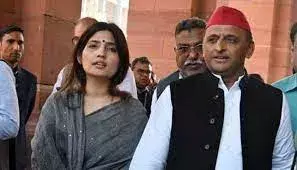Women’s Reservation Meaningless Without Caste Census: SP
Lucknow Gup

The Samajwadi Party (SP) parliamentarian Dimple Yadav has welcomed the Women’s Reservation Bill but she wonders when and how it will be implemented, and for whom?
The fear is that only women belonging to the ‘Upper Castes’ may benefit by the provisions provided in the Bill whenever it becomes a law.
The SP is the main Opposition party in Uttar Pradesh (UP) and it feels that any reservation for women is meaningless without a caste census. Besides the implementation of the present Bill allowing 33 percent reservation for women passed in the Lok Sabha last Tuesday is bogged down with the exercise of delimitation of constituencies, and census.
The problem is that it is not known when the next census will be held. The census was due in 2021, and now Yadav wants to know when the caste census will be held, without which reservation is reduced to just talk.
How can the state hope to benefit populations when it is not known how many people belong to which community, and who needs what kind of help? Opposition party members said that implementation of the Bill may not be possible any time soon as the delimitation of constituencies takes time from the publication of the census data.
The SP’s stand has been to support women in every which way but to also question why the Bill has been passed with a catch, and may not be implemented for decades to come? The SP has reiterated its stand that all women belonging also to minorities and backward classes should benefit from the Women's Reservation Bill.
The feeling amongst many people talked to in different parts of UP is that the way the Bill is at the moment it will benefit none except the already privileged. If the ruling party had the genuine interest of all women of the nation in mind, the same Bill could have been passed in 2014, as it had a solid majority in Parliament even at that time.
However, only a fresh census is expected to reveal the exact number of the population of each caste and community, before any work towards a more just society can be planned.
Divide and Rule
The Jatav community is the largest amongst the scheduled castes and is the core support of Mayawati’s Bahujan Samaj Party (BSP), while most Yadavs and Muslims support the SP. It makes sense to political opponents to wean the non Jatav Dalit voter away from the BSP and the non Yadav OBC voter from the SP to its side.
Aware of this game of numbers, the SP has introduced a new formula in the state for including more voters on its side, apart from the Yadav community. It is called the Pichda or backward, Dalit and the Alpasankhyak or the minorities (PDA). There are 79 OBC castes in UP out of which nine are backward class, 37 are more backward and 33 are most backward.
The SP chief and Dimple’s husband, Akhilesh Yadav, who belongs to the OBC, said that all members of the PDA must unite and work together to bring about equality and social justice. Akhilesh warned that the ruling party wants to mislead the OBCs, and to divide the OBC quota by snatching the share of one to give it to another.
This kind of politics will not lead to social justice but is a game of numbers simply to win elections. Akhilesh Yadav has continued to demand an immediate caste census to know the exact number of OBCs in the state.
Yadav wants a balance between gender justice and social justice. He said that the Bill should clearly state the percentage of reservations meant for backward, Dalit, minority, and tribal women.
The apprehension is that society is being encouraged to remain divided on the basis of caste. A member of the opposition party in Lucknow said that the strategy of the ruling party is to dole out freebies and positions to members of the backward caste, but to keep all power of decision making for itself.
In the past about 45 percent of the OBC population had voted for the ruling party despite any plan of action that has been implemented to make life easier for the mostly poverty stricken and illiterate population of the state. What is appreciated by members of the most backward castes is the free ration provided to them by the state.
The ruling party continues to try its best to attract the most backward castes to its side and away from regional parties like the SP, tempting the unemployed and very poor with freebies including rations and money in the bank account of the poorest of the poor.--
A Major Revamp
There is a major overhauling of the ruling party organisations at the district level in the state. The party has 98 organisational district units in UP. As part of the preparations for the coming general elections, presidents of 69 district units of the ruling party were changed last week.
In the 98 units, 57 presidents now belong to the upper caste followed by 36 from the OBC community. In the 2014 and 2019 general elections the OBC had voted in large numbers for the ruling party.
The newly appointed district unit presidents include 21 from the Brahmin community, 20 are Rajputs, eight are Vaishya, five Kayasth and three belong to the upper caste Bhumihar community, five are Dalits. The number of women is four.
However, there is no district president from the backward Pasmanda Muslim community amongst the 98 district units of the ruling party.



